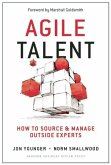Scholarly literature on talent management has largely taken a mainstream approach to understanding how and why organizations pursue talent initiates, and to understanding how employees react to participation in talent programmes. Managing Talent: A Critical Appreciation takes a more critical view of organizational approaches to identifying, developing and placing high potential employees and to understanding why organizations are attracted to talent management. Despite the expanding interest in the subject, these aspects have not received the attention that they deserve and require a more comprehensive appreciation of what has become a widely used organizational initiative. This edited work brings together a range of concerns arising from theory and practice but, while critical, is not intended to be entirely from a critical management studies perspective. Managing Talent new perspectives are now highly needed because of the relatively light treatment that talent management has witnessed so far from more critical management discourse. Chapters examine vital new issues including:Hinweis: Dieser Artikel kann nur an eine deutsche Lieferadresse ausgeliefert werden.
Bitte wählen Sie Ihr Anliegen aus.
Rechnungen
Retourenschein anfordern
Bestellstatus
Storno








